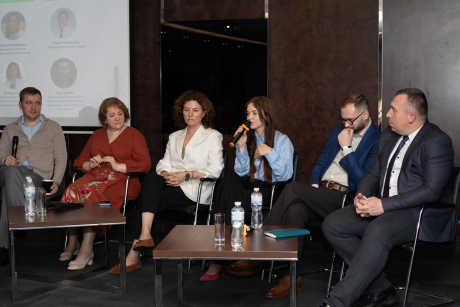UNIC Launches Integrity Month with BRIDGE 2025 Conference

On 29 May in Kyiv, UNIC inaugurated Integrity Month — an annual initiative that for the fifth time has brought together business, local authorities, civil society, and the expert community to discuss integrity-driven practices.
The opening event, the BRIDGE 2025 Conference, focused on cooperation between business and local self-government in the context of Ukraine’s recovery.
Antonina Prudko, Head of the UNIC Secretariat, emphasized in her opening remarks:
“When UNIC launched Integrity Month back in 2020, our ambition was to create not just a series of events, but a platform for dialogue and development across different communities — business, local authorities, and citizens committed to integrity and good governance. In times of crisis and uncertainty, it is critical to stay committed to principles, even when short-term, easier solutions may look attractive. Integrity cannot ‘wait for better times’ — it is the foundation of the future we are building today. Our goal now is to showcase how resilient, transparent, and trustworthy partnerships between business, local government, and communities can generate systemic change and ultimately transform into an effective Ukrainian model of recovery and EU integration.”
In his welcome address, Alan Pag Christensen, Head of the EU Anti-Corruption Initiative (EUACI), stressed the importance of inclusivity:
“Integrity requires a holistic, inclusive approach that brings all stakeholders on board. One cannot work only with anti-corruption agencies, or only with business, or only with local authorities. Everyone needs to be engaged and connected. That is how sustainable results are achieved. Today’s event is a clear example of applying such a comprehensive approach.”
Key Discussion Highlights
The panel discussion “Business and Local Authorities: New Models of Responsible Partnership”, moderated by local governance expert Oleksandr Solontai, brought together business leaders, municipal officials, and anti-corruption project representatives:
- Tetiana Bardina, Deputy Mayor of Poltava
- Andrii Zalivskyi, Mayor of Sheptytskyi
- Svitlana Mozhova, HR & Communications Director, Astarta-Kyiv
- Viktoriia Fokina, Head of Legal & Compliance, SKF Ukraine; UNIC Executive Committee Member
- Taras Sluchyk, Head of Cities of Integrity and Integrity Recovery Components, EUACI
The discussion addressed practical cases of cooperation, existing barriers, reputational risks, and the role of integrity in building trust between business and local government.
Key takeaways:
- Unequal starting positions for business. Large corporations usually have more resources, expertise, and reputation leverage, while SMEs, particularly young enterprises, often struggle to overcome corruption-related barriers.
- Limited authority of local government. Municipalities cannot influence courts, prosecutors, or law enforcement, which are often sources of systemic risks. Both business and local governments may simultaneously act as victims or unwilling participants in the broader corruption ecosystem.
- Redefining the role of local self-government. Local authorities should transition from regulators to partners, creating trust-based environments, supporting SMEs, and involving communities in decision-making.
- International support as a driver of change. Technical assistance programs such as EUACI, U-LEAD with Europe, EU initiatives, and methodological guidance from NACP strengthen institutional capacity, enable peer learning, and shape professional culture and reputation.
Additionally, Anastasiia Mazurok, Deputy Executive Director for Operations at Transparency International Ukraine, presented the Transparency Ranking of Ukrainian Cities. She highlighted its significance for entrepreneurs as both a decision-making tool and an advocacy instrument for policy change at the local level.
The next Integrity Month event — “The New Lobbying Law: Opportunities for Business or Emerging Risks?” — will take place on 11 June.
The BRIDGE 2025 Conference was organized with the support of the EU Anti-Corruption Initiative (EUACI) — the EU-funded and MFA Denmark co-financed flagship anti-corruption program in Ukraine.




